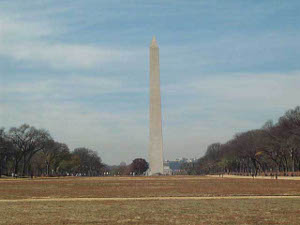 The Capitol of the United States
The Capitol of the United States
Normal tourists visiting Washington head for the Smithsonian. We've been spending our days in libraries and archives. So far we've concentrated on two federal institutions -- the Library of Congress (LC) and the National Archives (NARA) -- and one private one -- the Library of the Society of Daughters of the American Revolution (DAR).
The federal institutions are free and open to the public, while the private institution charges us each $5 a day. All three have helped us find out new information about ancestors and relatives, but we like the DAR library the best, and this week we've been trying to figure out why. What it comes down to is that the federal institutions don't seem to recognize that the requirement that they be open to the public carries with it the responsibility to be "user friendly."
 The Capitol of the United States
The Capitol of the United States
Of course the Library of Congress is primarily a national and Congressional depository, and the archives have the primary responsibility to safeguard the documents in their possession. But the law requires that these institutions serve the public, so they should take a tip from public libraries and do so eagerly. In fact, having good public relations will, in the long run, help these institutions obtain better Congressional funding.
It's been reassuring to us to see Washington quiet and calm - with perhaps a bit more security than before, but otherwise going about its business. We laughingly call Washington "Badge City," because it seems everyone needs at least one badge and some folks have many. At each of the libraries we have been issued a badge. It almost (but not quite) made us feel we were back at work!
 The Washington Monument
The Washington Monument
We filled out forms and got Research Identification Cards and had our bags and persons searched and set to work. At both the LC and NARA it takes an hour or so to get most materials (although microfilms at NARA are on open stacks and quite easy to use.) In one case we came back the next day to use requested materials.
Our experience doing genealogy at other libraries is that there is quite a bit of pulling a book off a shelf, thumbing through the index for a name of interest, not finding the name, and replacing the book again. This is impossible when you have to wait an hour or so for each book, as at LC. On the other hand, LC has such a huge collection, there's likely to be material there that can be found nowhere else. Our conclusion is that it's best to save up a lot of special questions for the LC, and use their online catalog to make sure the materials are available.
LC is in three separate buildings, and it would be quite some time before we could explore even those rooms which are open to the public. Genealogy is not their specialty, but of course they are without parallel in the area of U.S. History. So we expect we will be back at LC when we are trying to write up historical accounts of our nineteenth century families.
NARA is another story. The bureaucracy is, if anything, worse, because the originally records should be preserved as long as possible. But there are available materials in the archives that simply are not available anywhere else -- period. Original military records and federal land records are available in Washington, and we have inspected some going back a couple hundred years. Naturalization records, you'd think, would be centralized, but they're often held by local courts; only recently has INS started keeping central files, and most of these records apply to people who are still living. So next century's genealogists will find the INS records more useful than we have.
We feel most comfortable in the D.A.R. library. The tables, chairs, lighting, photocopiers are all just fine, and shelvers bustle about, instantly replacing all the books we continue to pull from the shelves. It's a specialized collection just bursting at the seams with family histories, histories of states and counties and towns and regions throughout the United States, and the old analytical card catalog is fun; over the years many dedicated indexers have made cards for even passing mentions of names in collections and general history works, as well as specific genealogical books.
It's turned out to be convenient for us to drive a mile and catch the Metro into town; all three libraries are close to the Orange Line. On the day before Thanksgiving the Metro was packed at 3:30. One passenger said (with good cheer) we were getting our Thanksgiving stuffing a day early. The riders are generally courteous and thoughtful of each other. Even the bouquet of roses one man was clutching to his chest made the trip safely, as people kept making room for the flowers.